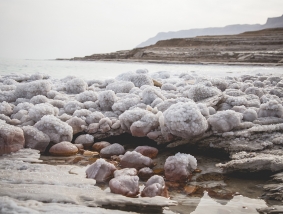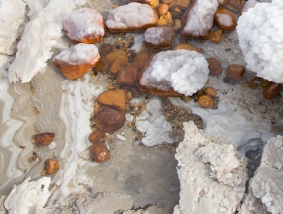When Cleopatra, the queen of ancient Egypt, also regarded as one of the most beautiful women in the world, wanted to nourish her skin and hair, she visited her own private beauty spa, the Dead Sea!
Long before science and cosmetics, Cleopatra knew that the secret of beauty lies in the waters of the Dead Sea, which contains a high concentration of salts and minerals that penetrate deep into the skin, bringing out the best of its health and beauty. Among other things, Dead Sea minerals nourish the skin, increase collagen production, maintain the skin’s moisture and the hair’s vitality, and may reduce the appearance of acne or skin inflammation.
Here, for example, are 11 minerals found in the Dead Sea that help the various functions of the body, and create beautiful, young and healthy skin.
Calcium
Calcium is involved in many body processes. Among other things, calcium helps to regulate skin cell renewal and cell division into different cell types, and it plays an important role in skin aging. Calcium helps in the production of collagen and is therefore important in helping to create a strong body, healthy skin and a toned appearance. In addition, calcium makes a significant contribution to the appearance of healthy, beautiful hair and strong nails. This is because calcium is used to produce keratin, a protein that forms the body’s cornified tissues, such as nails and hair.
Zinc
Zinc helps to balance the secretion of excess oil (sebum) and the creation of clean skin, so it is effective against pimples (acne). Sometimes, acne is a sign of zinc deficiency in the body. Zinc protects the body and skin against free radicals, contributes to cellular regeneration, and is involved in the process of collagen production.
Zinc also has a calming and healing effect and is, therefore, a common ingredient in products used in the treatment of skin disorders, such as psoriasis, hemorrhoids, or as an agent in anti-acne products that help to balance the skin.
Magnesium
Magnesium is important for healthy bone structure. In addition, magnesium is easily absorbed by the skin via sweat glands and hair follicles. It is often used to accelerate healing. It also strengthens the skin barrier and serves as a component in cold or hot compresses to soothe inflamed skin.
Potassium
Potassium is essential for many functions, such as normal heart rhythm, muscle contraction, and fluid balance. In terms of skin, it is known that potassium maintains the skin’s moisture level. Potassium deficiency can lead to increased dryness and even acne.
Sulfur
Sulfur is a common mineral present in every cell in the body. For example, sulfur helps to produce collagen, which is responsible for the skin’s firmness and tone and is part of the keratin structure that makes the hair, skin, and nails strong.
Sulfur is known to have excellent antiseptic properties and is therefore used to fight the bacteria that causes acne, red skin (rosacea), dandruff or seborrheic dermatitis. Sulfur can help to heal wounds, while sulfuric baths have been used throughout history to treat psoriasis, joint pain and inflammation.
Phosphorus
Phosphorus is an essential mineral found mostly in the structure of bones and teeth, where it is active together with calcium. Phosphorus is also needed to build protein for growth and to repair cells and tissues. It contributes to the structure and strength of hair and nails. It helps maintain the balance and use of other vitamins and minerals, such as B-group vitamins, vitamin D, iodine, magnesium, and zinc.
Sodium
Sodium is found in all body fluids and its function is to maintain an adequate amount of water in the body. Natural sodium, together with potassium and other salts, used in bath water has osmotic and balancing effects, may stimulate metabolism, and gives a refreshing sensation while maintaining the skin’s moisture.
Lithium
Lithium functions in the body together with enzymes, hormones, vitamins and growth factors, in several mechanisms, particularly in the brain. Lithium is given as a supplement to treat various mental illnesses, as well as headaches, liver disease, and skin disorders, such as seborrhea.
Boron
Boron is an essential mineral for the body. The presence of boron in the body influences the absorption of other important minerals, such as calcium, magnesium, and phosphorus. In addition, boron increases the level of estrogen in mature women and is therefore strongly associated with the maintenance of healthy bones and mental functioning. Some use boron to treat yeast that causes vaginal infections or to prevent skin inflammation.
Strontium
Strontium is a chemical element, a mineral, that is mostly found in the bones, although its essential nature to the body has not yet been proven. In addition, it is effective in treating itching and irritation and is therefore used to soothe the skin. For example, it can help calm sensitive skin following an adverse reaction to chemicals in cosmetics. It is also effective in reducing skin inflammation.
Manganese
Manganese is a mineral required for normal body functioning, including the metabolism of carbohydrates, proteins, and cholesterol. It also plays a role in wound healing, and helps in the production of collagen, for the development of a healthy skin layer. Manganese acts as an antioxidant that neutralizes oxidizers, which cause damage to the body.
This article, its authors and owners are not attributing any of the above claims to any Dead Sea product, each product should be evaluated separately without any association to this article.
References:
- WEBMD: Nutrients for Healthy Skin: Inside and Out.
- Fairley JA. Calcium and the Skin. Arch Dermatol 1988;124(3):443-444.
- Rinnerthaler M et al. Skin aging, gene expression and calcium. Exp Gerontol 2015 Aug; 68:59-65.
- Powell SR. The antioxidant properties of zinc. J Nutr 2000;130(5S Suppl):1447S-54S.
- WEBMD: www.webmd.com/vitamins/ai/ingredientmono-982/zinc
- MacDonald RS. The role of zinc in growth and cell proliferation. J Nutr 2000;130(5S Suppl):1500S-8S.
- Uwe Gröber et al. Myth or Reality—Transdermal Magnesium? Nutrients 2017; 9(8): 813.
- WEBMD: www.webmd.com/diet/supplement-guide-magnesium
- Proksch E et al. Bathing in a magnesium-rich Dead Sea salt solution improves skin barrier function, enhances skin hydration, and reduces inflammation in atopic dry skin. Int J Dermatol 2005;44(2):151-7.
- WWW.ods.od.nih.gov/factsheets/Potassium-HealthProfessional
- www.livestrong.com/article/287264-why-low-potassium-causes-skin-problems/
- WEBMD: www.webmd.com/vitamins/ai/ingredientmono-1527/sulfur
- Parcell S. Sulfur in human nutrition and applications in medicine. Altern Med Rev 2002;7(1):22-44.
- www.livestrong.com/article/441274-how-does-sulfur-help-the-body.
- WEBMD : www.webmd.com/vitamins/ai/ingredientmono-182/manganese
- www.Oregon State University: manganese
- Hahn GS. Strontium is a potent and selective inhibitor of sensory irritation. Dermatol Surg 1999;25(9):689-94.
- WEBMD: www.webmd.com/vitamins/ai/ingredientmono-894/boron
- WEBMD: www.webmd.com/vitamins/ai/ingredientmono-1065/lithium
- WWW.medlineplus. Phosphorus
- WEBMD: www.webmd.com/osteoporosis/news/20020320/bones-need-both-calcium-phosphorus
- PHOSPHORUS. by Dr. Lawrence Wilson. June 2015, L.D. Wilson Consultants, Inc.
- Healthline: Madell R. Medically reviewed by Debra Sullivan, December 14, 2015.
- Tajima T et al. The influence of calcium ions on the synthesis of collagen and glycosaminoglycans in human diploid cells in culture. Exp Pathol 1981;19(4):219-25.
- Picardo M et al. Characterization of cultured nail matrix cells. J Am Acad Dermatol 1994;30(3):434-40.
You might also like

What makes the Dead Sea so unique?
February 12, 2020






